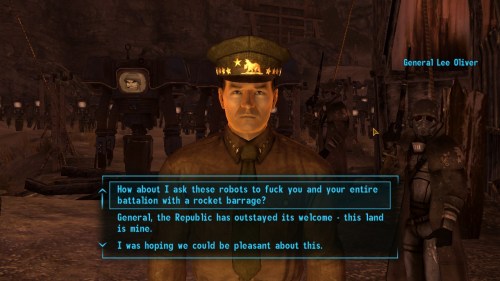Chris Avellone Comments on Diplomatic Problem Solving In Games
|
Chris Avellone, senior designer of Fallout New Vegas and the older Fallout titles, had some interesting insight regarding diplomatic solutions in games in a very lengthy interview with Iron Tower Studio. On the subject, Avellone states the following; “It caters to a small % of players, and those players find it meaningful if that’s the power fantasy they want. To cite the best example, in Fallout 1, I think it’s pretty ego-boosting to point out the flaws in your adversaries’ master plan so much that he suicides after talking to you. I really can’t be more of a talking badass than that. It is difficult to implement a speech/sneak path, and the main obstacles to it are many, so here’s my opinion on how to approach it: The speech path should present more than a skill check challenge – there needs to be some other obstacle associated with it. I usually veer toward exploring conversations (asking about back history, reading lore, discovering evidence to a criminal case), exploring the environment (discovering an enemy encampment, learning a secret path into a fortress, discovering a rival caravan is already sending an emissary to scout a new trade route), or being able to draw logical connections between two topics… Obsidian has a rule in quest design that any non-violent path has to have a reward that’s comparable to killing and looting everyone in the scenario, and has similar repercussions. Whether this is XP bonus greater than killing the opponent, alignment shifts, barter rewards, or whatever, speech-defeating someone can’t yield you less in the long run than it would if you killed everyone. Often, it can yield more if you’re patient… or if you decide to shoot the person in the face after you verbally crushed them. In some ways, it could be considered a speech bribe. I’ll be honest, KOTOR2 was a huge speech bribe as well – once people figured out that’s how you could make Jedi or Sith from characters by interacting with them, suddenly there’s a lot more incentive in getting to know your allies and playing the influence game. I will say this doesn’t always work (I’ve seen YouTube footage where people simply rapidfire through the FNV DLC1 Dead Money conversations just looking to mine the XP awards, which makes me die a little inside – but hey, it’s more than they would otherwise).” So, Avellone notes a couple of key problems with modern approaches to diplomacy in games. It’s mostly skill-check–do you have a high enough stat? rather an inference, and the structure of dialogue as a mechanic in games (XP rewards and all) devolves conversations into just another impersonal way to farm experience. It’s interesting, too, that he calls it another form of ‘Power Fantasy’ especially within the context of Fallout , a franchise that has multiple instances where one can convince an adversary to suicide via dialogue. Normally I associate combat-heavy games to adhere to a power fantasy ideal, but he’s right, diplomatic solutions are no different. Silver tongues turn you into a sly trickster, capable of convincing people to downright eat their newborns if it came down to it. |

Pingback: Chris Avellone Comments on Diplomatic Problem Solving In Games … | Solve Math & Science Problems - Solveable.com